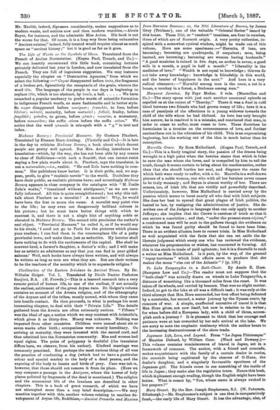Civilisation of the Eastern Iranians in Ancient Times. By Dr.
Wilhelm Geiger. Vol. I. Translated by Dirab Dilator Peahoton. San** B.A. (H. Frowde.)—This is a learned research into a very remote period of human life, to one of the earliest, if not actually the earliest, settlement of the great Aryan race. Dr. Geiger's volume contains an account of the Avesta religion, and of the ethnography of the Aryans and of the tribes, mostly nomad, with whom they came into hostile contact. He then proceeds, in what is perhaps his most interesting chapter, to deal with their "Private Life." The details gathered from the Avesta are often extremely curious. " Fifteen " was the ideal of age, a notion which we may contrast with Aristotle's, which gives it as thirty-five. Money was unknown. Nothing was imported from other countries. Children were named about six or seven weeks after birth ; occupations were mostly hereditary. On arriving at maturity, they were invested with the sacred cord, and thus admitted into the Zoroastrian community. Men and women had equal rights. The point of polygamy is doubtful (the translator differs here, we observe, from his author). Kindred marriage was commonly practised. But perhaps the most curious thing of all was the practice of conducting a dog (which had to have a particular colour and special marks) to the body of a dead person, and the exposing of the body to beasts and birds of prey. Care was tak however, that these should not remove it from its place. (Here we may compare a passage in the Antigone, where the horror of holy places polluted by fragments of the dead is mentioned.) The religion and the economical life of the Iranians are described in other chapters. This is a book of great research, of which we have not attempted more than a very brief description—We may mention together with thin another volume relating to another de- velopment of Aryan life, Buddhism,—Ancient Proverbs and Maxims from Burmese Sources ; or, the 141fti Literature of Burma, by James Gray (Triilmer), one of the valuable " Oriental Series" issued by this house. These NW, or " conduct " treatises, are four in number, three of which are of Sansorit origin. A very pretty collection, in- spired with a somewhat cynical wisdom, might be made out of this
volume. Here are some specimens Hermits, if lean, are becoming; becoming are quadrupeds, if corpulent; men, being learned, are becoming; becoming are women having husbands." "A good musician is rained in five days, an aroher in seven, a good wife in a month, a pupil in half a month." "Liberality is the medicine of love." " Wealth is not equal to knowledge ; thieves do not take away knowledge knowledge is friendship in this world, and the bearer of happiness in the next." And here is a very radical utterance:—" Harmful among men. is the crow, a rat ins house, a monkey in a forest, a Brahman among men."


































 Previous page
Previous page